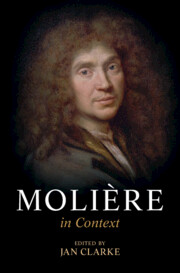Book contents
- Molière in Context
- Molière in Context
- Copyright page
- Dedication
- Contents
- Figures
- Charts and Tables
- Contributors
- Acknowledgements
- Translations
- Abbreviations
- Biographical Preface
- Part I Socio-Political Context
- Part II Intellectual and Artistic Context
- Chapter 7 Philosophical Influences
- Chapter 8 Molière and Classical Theatre
- Chapter 9 The Survival of Medieval and Renaissance Professional Practices
- Chapter 10 Commedia dell’arte
- Chapter 11 The Literary Establishment
- Chapter 12 Are the Précieuses Only Ridicules? Molière, Salon Culture and the Shaping of France’s Collective Memory
- Part III Theatrical Context (Paris)
- Part IV Theatrical Context (Court)
- Part V Reception and Dissemination
- Part VI Afterlives
- Further Reading
- Index
Chapter 7 - Philosophical Influences
from Part II - Intellectual and Artistic Context
Published online by Cambridge University Press: 10 November 2022
- Molière in Context
- Molière in Context
- Copyright page
- Dedication
- Contents
- Figures
- Charts and Tables
- Contributors
- Acknowledgements
- Translations
- Abbreviations
- Biographical Preface
- Part I Socio-Political Context
- Part II Intellectual and Artistic Context
- Chapter 7 Philosophical Influences
- Chapter 8 Molière and Classical Theatre
- Chapter 9 The Survival of Medieval and Renaissance Professional Practices
- Chapter 10 Commedia dell’arte
- Chapter 11 The Literary Establishment
- Chapter 12 Are the Précieuses Only Ridicules? Molière, Salon Culture and the Shaping of France’s Collective Memory
- Part III Theatrical Context (Paris)
- Part IV Theatrical Context (Court)
- Part V Reception and Dissemination
- Part VI Afterlives
- Further Reading
- Index
Summary
The hagiographic myth of Molière as a moralist philosopher and the fable of studies under Gassendi are cognitive obstacles to a philosophical clarification. Crystallised into scholarly core beliefs, such legends have caused the comedies to be interpreted unquestioningly as philosophical statements, while overlooking nondramatic texts that could be considered philosophical writings, including the preface to Tartuffe with its definition of philosophy. Molière composes comedies according to a purely theatrical logic, not to advertise ideologies through philosophising characters and philosophemes. Hence the doctrinal inconsistency of most philosophising characters, including the raisonneurs – regarded as flag-bearers of his supposed philosophy of moderation. Often taken literally, philosophemes require dramaturgical analysis to separate those dramatically motivated from those lacking dramaturgic purpose. Rather than a covert anti-Christian philosophy, the medical satire belongs to a robust comical epistemology correlating antiquated medicine and pseudoscience. Indeed, Molière’s last words on stage are to ridicule pseudoscience, which benefits the scientific revolution. Moreover, crucial experiments in the last comedies reflect the influence on his dramaturgy of the new, fashionable experimental culture promoted by Cartesians. Rejecting an Aristotelian tradition of theatre philosophically text centred, Molière invented total spectacle and accomplished a theatrical revolution concomitant with the paradigm shifts triggered by the Copernican revolution.
- Type
- Chapter
- Information
- Molière in Context , pp. 71 - 80Publisher: Cambridge University PressPrint publication year: 2022

